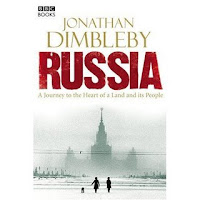The Sunday Book Review: Essel on Dimbleby on Russia
 Dave Essel writes:
Dave Essel writes:
From de Custine onwards, writing about one's visit to Russia has been something of a little literary industry. Such books appear with extraordinary regularity. And they all have something in common: no one, to my knowledge, has ever returned from Russia and written a book with rave reviews expressing the opinion that one should move there pronto to enjoy a taste of heaven on earth or perhaps just a decent life. It doesn't even matter whether you you are right-wing or left: the great anarchist Emma Goldman, deported to Russia from America in December 1919 came by 1923 to write a book entitled My Disillusionment in Russia. The recent tradition, however, has been for such books to be written by supposed experts such as the Russia correspondents of heavyweight newspapers and so on. I see from the following review in the Economist that there is now a book (Russia, Journey to the Heart of a Land and its People) more along the lines of de Custine's, i.e., written by a non-specialist, this time by English general purpose broadcaster and commentator Jonathan Dimbleby. His conclusions are, of course, the same as all those who preceded him. It certainly joins my list of book to buy and read (time permitting).
Here is the review:
SPENDING time in Russia is a bit like taking the psychotropic anti-malarial drug Lariam: anyone with a propensity to anxiety should probably avoid it. Jonathan Dimbleby, an accomplished British broadcaster, was by his frank admission in a state of considerable emotional turmoil when he travelled from the Arctic city of Murmansk to Vladivostok. The overwhelming landscape and the people who were often so rude did not help his mood, but his responses—awe, horror and frustration—were perhaps more acute as a result.
The ugly authoritarianism of Vladimir Putin's Kremlin and Russia's hydrocarbon-fuelled diplomatic bolshiness are now well documented. There are fewer worthwhile accounts of ordinary life across the vast, eccentric Russian continent in the Putin era. Mr Dimbleby's perceptive travelogue is one of them. He describes the spookiness of St Petersburg; the micro-cultures (and pointy shoes) of the Caucasus; the desolation of Beslan; the magic of Tolstoy's country estate; the ludicrously dangerous roads and dreadful hotels. He captures the way Russians are transformed by toasts, the romance of long-distance train rides and the squalor of train stations. He encounters a Karelian witch, a Siberian shaman and wild horses in the Altai mountains. He visits a plush Moscow banya. He drinks a lot of vodka.
Along the way he offers lively summaries of some of the key dramas of Russian history, including the exploration of Siberia, the tragic nobility of the Decembrists and the unspeakable siege of Leningrad. He meets the kind of near-saints that only places with so much bad history can produce: suicidally brave journalists in Samara; campaigning environmentalists in the Urals; a heroic AIDS worker in Irkutsk. They vary what might otherwise have become a dismal parade of villainy.
“We steal,” a Caspian sturgeon poacher says, “and we think nothing of stealing because everyone is stealing.” Mr Dimbleby notes the gangsterism of government at all levels, the brazen rackets and the cradle-to-grave corruption that Russians must negotiate to survive. He nicely portrays the fatal combination of savage indifference on the part of the country's rulers and the enraging fatalism of the ruled. He is perpetually baffled by what, to his Western ears, sound like contradictory attitudes: the Russians he meets are sophisticated, acquisitive and yet cynical to the point of hostility towards democracy. “Crypto-fascist” is his label for the system Mr Putin has built.
Mr Dimbleby loves Russian literature, and he hears Tolstoyan and Gogolian echoes as he travels. But he is not a Russia expert (he undertook the journey for a BBC television series), and makes some mistakes and simplifications, over Chechnya and the Yukos affair, for example. That, however, is also his book's main virtue. His novice's eye sees the moral outrage in everyday injustices—the use of malnourished teenaged conscripts as slave labour, say, or the routine persecution of migrant labourers—to which more practised Russia-watchers are too often desensitised. His disgust is mitigated by the fascination that Russia somehow inspires too, even in the most sceptical visitor.


















No comments:
Post a Comment